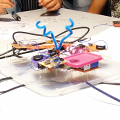Difference between revisions of "Sensors, Probes and Detectors"
From (art)scienceblr
| Line 1: | Line 1: | ||
Sensors, probes and detectors, course into here. | Sensors, probes and detectors, course into here. | ||
| − | + | '''Mini Projects''' | |
| + | ------- | ||
| + | ------- | ||
<!-- Projects --> | <!-- Projects --> | ||
<div class="alertBox1"> | <div class="alertBox1"> | ||
{| class="alert" | {| class="alert" | ||
| − | |||
|- | |- | ||
| Line 22: | Line 23: | ||
</div> | </div> | ||
<!-- Projects end --> | <!-- Projects end --> | ||
| + | |||
| + | '''Documentation''' | ||
| + | ------ | ||
| + | ---- | ||
| + | <!-- Course Documentation --> | ||
| + | <div class="alertBox1"> | ||
| + | {| class="alert" | ||
| + | |||
| + | |- | ||
| + | |'''Project 2: [[SP Road trip]]''' | ||
| + | |||
| + | [[Image:bioelectronics_after_casting.jpg|120px|left]] | ||
| + | |||
| + | Integrating electronics into biological culture devices needs different approaches. the use of silicone-rubbers for sealing off the wet/humid bio-part from the silicon circuits and sensors allows the making of hybrid bioelectronic devices. | ||
| + | |||
| + | |||
| + | </div> | ||
| + | <!-- Course Documentation end --> | ||
Revision as of 10:02, 27 September 2015
Sensors, probes and detectors, course into here.
Mini Projects
| Project 1: Microrobot
Introductory class. more details here | |
| Project 2: SP Road trip
Integrating electronics into biological culture devices needs different approaches. the use of silicone-rubbers for sealing off the wet/humid bio-part from the silicon circuits and sensors allows the making of hybrid bioelectronic devices.
Documentation
|
